| Brook Cottage
There was no gas, electric or mains water anywhere on Penn
Common. We used oil lamps and candles for lighting; we had an
oil lamp on the table. We got by. When you’ve not known anything
else you don’t know any better. I used to have to fetch the
paraffin for the lamps from Gospel End. |
|
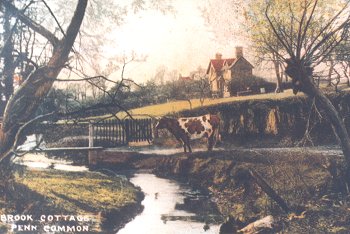
Brook Cottage. From an old postcard. |
We had a lovely big sitting room that had a black
grate with an oven for cooking. The grate, in the kitchen where we
lived, had two ovens which we used every day and the coal for the
fire was brought on a cart from Baggeridge. The coal was tipped in a
load by the gate and had to be brought-in. It was lovely coal; it
gave off a lot of heat. You can’t beat a coal fire, it seems to warm
the whole house. It’s not like electric. When you switch it off it’s
gone cold in ten minutes. We had small fireplaces upstairs but never
used them unless someone was ill. |
| To heat water we had two great big kettles on each
side of the hob in the kitchen; we had a fire in there all the time.
In the kitchen was the brown earthenware washing up sink and we used
to bath there in a tub. We had a sink and a drain but didn’t have
any taps; nobody on the common had got taps. You would bring water
in a bucket. We had two kitchens. The second one, the back kitchen
as it was called, had a settle; a sort of low sink that was used
when we cut the animals up. |
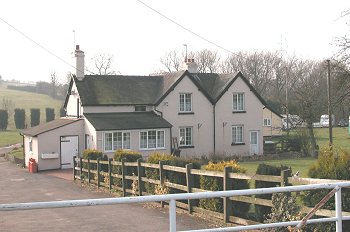
Brook Cottage as it is today. |
| We grew our own vegetables. By the cowsheds was a
big field which we ploughed and made into a big garden. We grew
potatoes there and also in a small field by the house we grew
cabbages, leeks and a few potatoes. Mother used to make cakes but it
was a real treat to have a cake from town. When I went to school, I
went to cookery classes every Tuesday and learned to make bread and
cakes. We had to be self-sufficient; there was no other way. Get a
night of snow and you wouldn’t be able to go out and get your bread
or anything else. We have had it deep, but you still had to go to
the spring to fetch the water. |
|
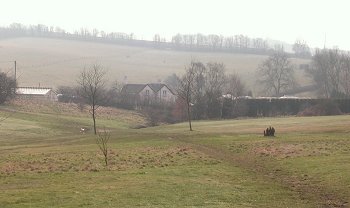
Another view of Brook Cottage from near the
old spring. |
The nearest shops were at Gospel End. I used to have
to go and get the newspaper every day. In the dark nights I would
have a lantern with a candle in it. I never used to think twice
about going through the woods in the dark. The nearest letterbox was
at the Wodehouse bridge. You used to have to go all through the
Baggeridge woods and the Wombourne woods to post a letter, and if I
said I didn’t want to go I would be sent upstairs to bed. |
| Our post lady lived in the old brewery building. I
think she used to have to go to the post box to collect the mail as
well as delivering mail all around the common.
There were no vehicles on the common, just horses and traps. We
had four horses, typical working horses. I loved one, his name
was Bonny. He was a lovely sandy coloured horse, ever so strong.
He used to bring the grain, a massive pile of grain back.
The Orchard |
| We had big fruit trees in the paddock. There were
apple trees and "Tettenhall Dick" pear trees. The pears were called
"Tettenhall Dicks" and were small and sweet. They didn’t grow as big
as normal pears. We’d got two "Tettenhall Dick" trees and there were
millions of pears. They looked lovely in the spring when they were
in blossom. The trees were so high that we couldn’t pick the fruit,
you had to wait for it to fall off. The pears were a yellow colour
when they were ripe. |
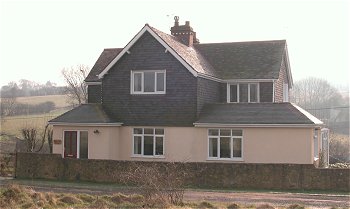
Next door was Baggeridge Cottage which was
also owned by Elsie's aunt. |
| We used to give the fruit away. We had to go to all
of the cottages at the bottom of the common and the brewery and say
"Will you tell Mrs. so and so to come along with her bucket and
pick-up what fruit she wants". We were glad of them to pick it up
because there was so much. It wasn’t worth trying to sell it. I used
to take pockets full of them to school and bags to give to my
friends.
Water |
|
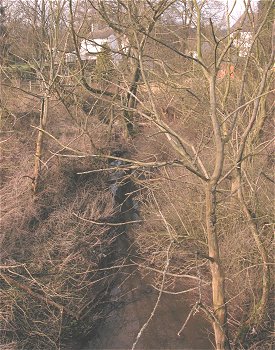
Penn Brook from the Sedgley Road bridge. |
It was always my job, from the time when I could
carry a can, to go down to the paddock along the lane, cross the
next field with two cans to fetch the water. It was clean water out
of the spring. I used to fill the cans and carry them all the way up
the bank to the cottage. I had to do it before I went to school in
the morning and continued nearly until I got married.
Tom, my cousin, lived in the next house. He was wounded in the
war and my aunt brought the house for him to live in and left it
to him when she died. Tom built a framework over the top of the
spring, which partly filled with water. He put a lid on top to
stop the leaves blowing in. Tom used to have to come to the same
spring to fetch their water. The water was always icy-cold,
lovely. It was sparkling and alive. In the summer people used to
knock our door and ask if they could get a glass of water
because it was so cold. |
| Even in the winter the spring never froze-up
because the water was always moving. If you looked down into the
well you could see sand at the bottom, almost white and the water
was coming up all the time, it was never still. There were several
springs and the people there either had a spring or used a pump.
Some of the cottages at the top of the common had a pump.
You couldn’t get water to drink out of the brook. There was
everything in it, all the usual country animals, water rats and
everything. We used to go in it a lot. We used to love paddling
in it and people used to come down in the school holidays. |
 |
|
 |
|
 |
|
Return to Early Years |
|
Return to the beginning |
|
Proceed to The Animals |
|